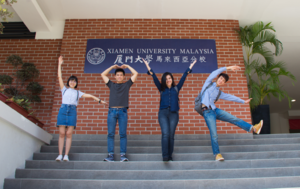- About
- Admissions
-
Academics
- Research & Innovation
- Campus Life
- Library
- More
Text
About the Programme
Doctor of Philosophy in Computer Science and Technology is the first PhD programme offered by the School of Computing and Data Science (SCDS). It provides a platform to nurture talents in innovative and cutting-edge research for the next generation. This PhD programme is open to all potential students with diverse computing backgrounds, include but not limited to Information Systems, Cybersecurity, Data Science, Artificial Intelligence, Computer Science, Computer Engineering, Digital Media Technology, and Software Engineering. This programme covers advanced topics such as:
- Algorithms & Theory
- Artificial Intelligence (AI)
- Software Technology
- Databases
- Parallel Computing
- Networking and Distributed Systems
- Human-Computer Interaction (HCI)
- Digital Media Technology
- Computer Graphics
- Multimedia Information Retrieval
- Computer Security / Cyber Security
- System Security
- Network Security
Students in this programme have the opportunity to deepen their expertise through rigorous research projects, collaborative endeavours with esteemed faculty mentors, and access to cutting-edge facilities and resources. By engaging in these activities, they not only expand their knowledge base but also cultivate critical research skills and methodologies essential for academic and industry leadership roles.
Additionally, students are encouraged to participate in international competitions and to publish their research in reputable journals and conferences, helping them gain recognition and further establish their expertise in the field. The programme also fosters collaboration with other universities, providing students with broader research opportunities and exposure to a diverse range of academic perspectives.
Programme Highlights
- Supervision and guidance from experienced faculty members.
- Emphasis on research and thesis writing under the mentorship of dedicated supervisors.
- Access to advanced facilities and laboratories.
- Participation in seminars, workshops, and conferences to enhance academic and professional development.
- Preparation for diverse career paths in academia, industry, and research.
Career Opportunities
Graduates of the programme have diverse career opportunities across industries such as research, academia, and technology-driven sectors. Potential roles include as follow:
- Data Scientist
- Machine Learning Engineer
- Cybersecurity Analyst
- Systems Architect
- Database Administrator
- Cloud Engineer
- Al Researcher
- IT Consultant
- DevOps Engineer
- Full-Stack Developer
- Product Manager
- Business Analyst
- Research Scientist
- IT Project Manager
They can pursue employment in private organisations, government sectors, academic institutions, and research facilities, among others.
Entry Requirements
- A Master's degree (Level 7, MQF) in the field of Computing or related fields as accepted by the HEP Senate; OR
- A Master's degree (Level 7, MQF) in non-computing fields with a minimum of FIVE (5) years of working experience in the field of computing or related fields must undergo appropriate prerequisite courses as determined by the HEP; OR
- A Master's degree (Level 7, MQF) in non-computing fields with less than FIVE (5) years of working experience in the field of computing or related fields must undergo appropriate prerequisite courses as determined by the HEP and subject to rigorous internal assessment; OR
- Other qualifications equivalent to a Master's degree in the field of Computing or related fields recognised by the Government of Malaysia must undergo appropriate prerequisite courses as determined by the HEP.
* Rigorous assessment can be done through interviews, portfolios, written tests, or any form of assessment. If the assessment fulfils the requirements, the candidates can be exempted from taking the prerequisite courses.
English Competency Requirement (International Student):
- Achieve a minimum score of 6.0 in the IELTS or equivalent. If a student does not meet this requirement, the HEP must offer English proficiency courses to ensure that the student's proficiency is sufficient to meet the needs of the programme.
List of Courses Offered
Text
- Research Methodology
- Thesis
Text
- Chinese 1
- Selected Topics on China
*No additional tuition fees imposed.
Note:
- Students who obtained a Bachelor's or Master's degree in China can be exempted from Selected Topics on China.
- Students with a credit for Chinese course in previous result slips (UPSR/ SPM/ O-Level/ UEC/ A-Level/ Foundation/ Matriculation/ Diploma/ HSK etc.) can be exempted from Chinese 1.









